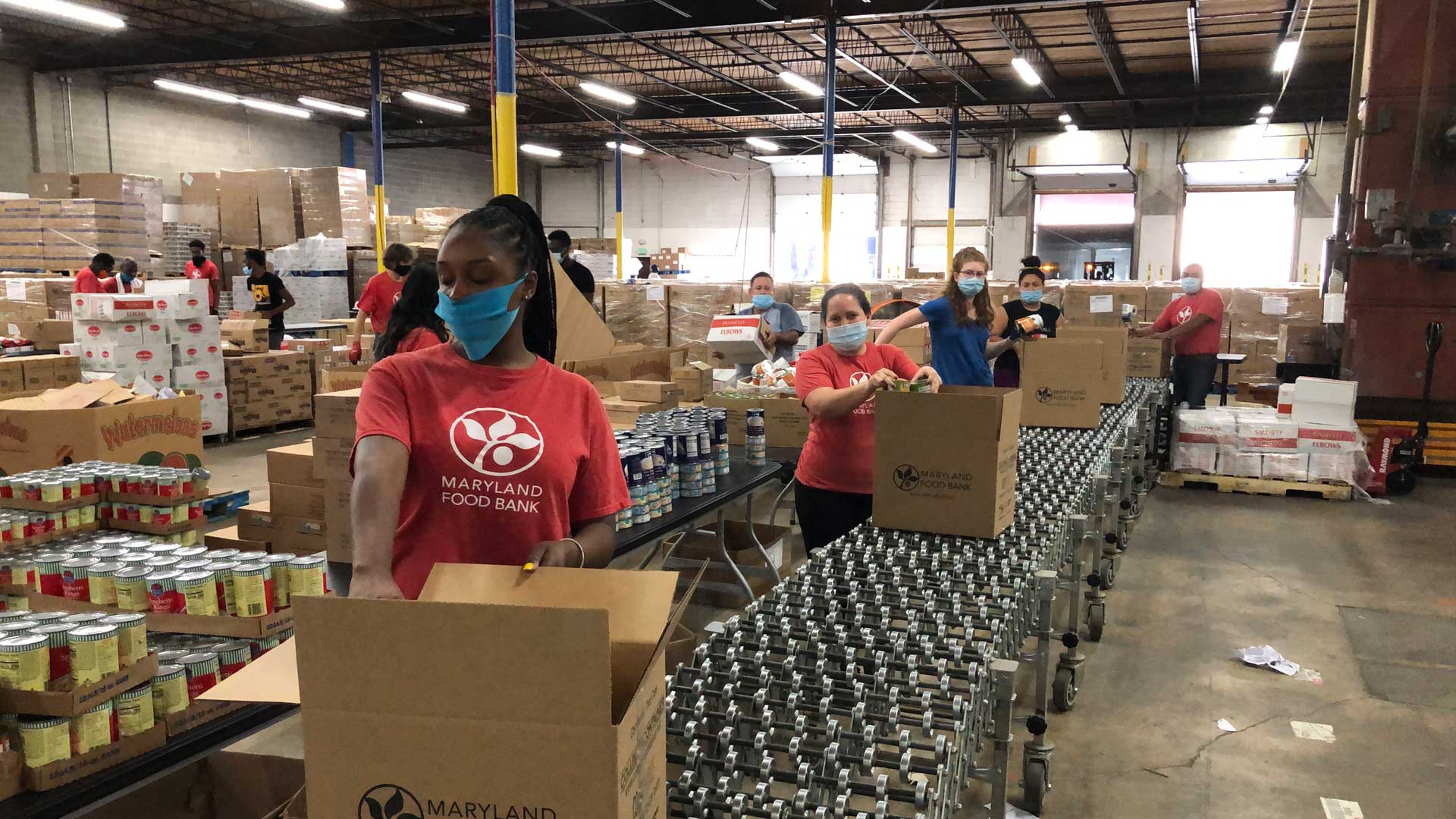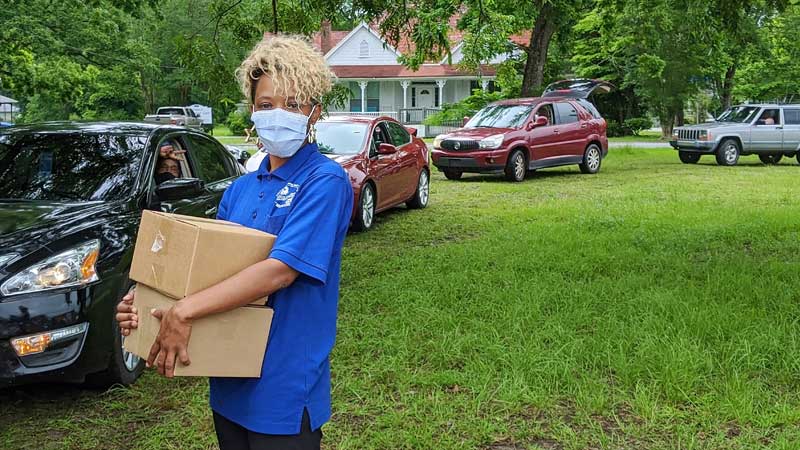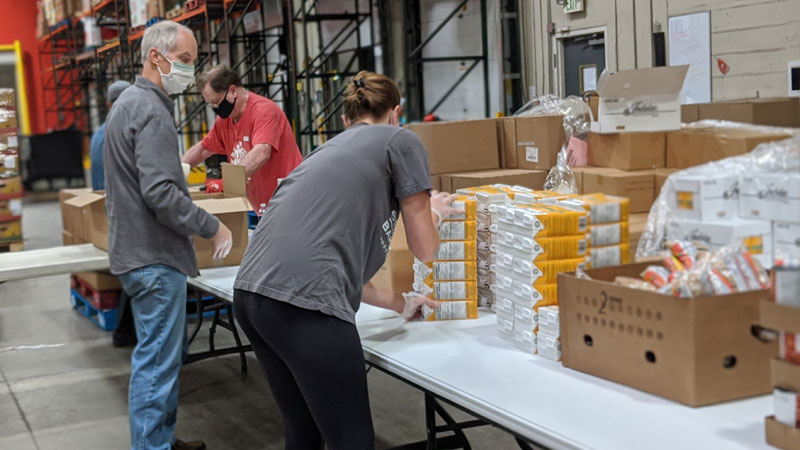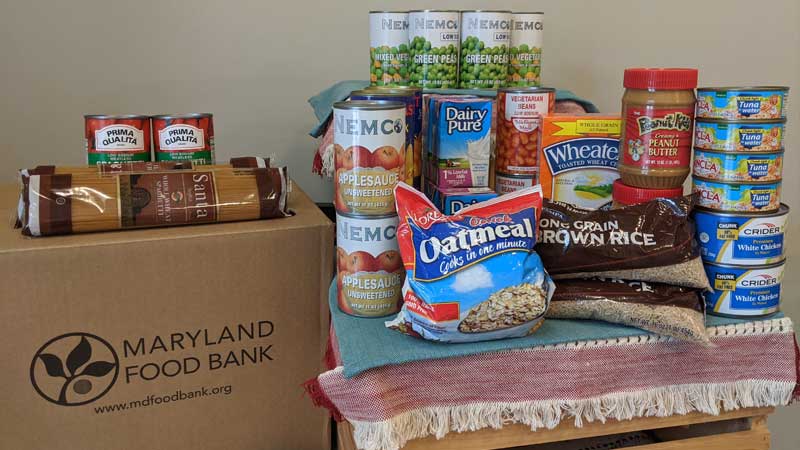Building a Better Maryland During COVID and Beyond

The Maryland Food Bank was established over 40 years ago with one primary goal in mind: providing food to Marylanders struggling to secure food themselves. In recent years, however, we’ve grown more and more deliberate when it comes to the types of food we’re supplying our neighbors in need.
As the hub of Maryland’s food assistance safety net, MFB has taken on the additional responsibility of bridging nutritional gaps between food-insecure communities and access to healthy food. COVID-19 unfortunately posed a threat to this work, forcing us to refocus our efforts solely on food distribution at the start of the pandemic. But the food bank is built to adapt in unprecedented situations and support Marylanders in need no matter the circumstances.
While Back Up Boxes (BUBs) initially originated as an immediate solution in response to COVID, the Back Up Box 2.0 (BUB 2.0) is our new and improved version of these food kits, enabling us to safely distribute healthy, nutritious foods throughout the pandemic and well into the future.

A Right to Healthy Foods
Pre-COVID, MFB had made major strides to bring more nutritious foods into the hands and homes of those who need it most through the implementation of SWAP (Supporting Wellness at Pantries) at select client choice pantries.
The SWAP system of ranking food based on nutrition level simplified the process for our Network Partners when selecting healthy foods for the families they served. Working closely to pilot the program with Kate Long, MFB’s Director of Nutrition, these partners got a taste of what their communities would look like with widespread access to healthy, nutritious food. Then, the world changed.
Factors like housing instability, the high cost of living, and under/unemployment should never dictate whether a person deserves a healthy meal. But once the pandemic hit and the number of Marylanders experiencing these challenges skyrocketed, the effort to make healthy food universally accessible proved to be an increasingly difficult feat. To adequately serve the surge in need across the state, we needed to adapt, and fast.
Born Out of Necessity
“Back Up Boxes were created in early March because we had to get food out safely, quickly, and at levels that we have never before seen,” said MFB Executive Vice President of Programs & External Affairs, Meg Kimmel. “Now our new and improved Back Up Box 2.0 will be able to do even more by providing immediate access to high-quality, healthy food which is, unfortunately, not an option for hundreds of thousands of Marylanders.”
With COVID-19 threatening the “normal” everyday lives of people across the nation, MFB’s initial response involved increased communication with our partner network, a modification of operations, and the creation of innovative programming.
Back Up Boxes quickly emerged as an efficient tool to maximize our distribution efforts and serve the rapidly increasing population of Marylanders struggling to secure food because of the virus.
This program proved to be more successful than MFB could even imagine. Our initial goal of distributing 30,000 BUBs to families hit hard by the negative effects of the pandemic was shattered six times over, as more than 200,000 Back Up Boxes have been distributed since being introduced in March 2020.

The New and Improved Back Up Box
The success of Back Up Boxes as well as improvements to the food supply chain has positioned MFB to renew our focus on improving the quality of the food we distribute, a key piece of Phase 2 of our COVID-19 Response Plan.
“Now that we’ve hit our stride in effectively feeding people during COVID, we can take a step back and be more strategic about the types of food put into these boxes and delivered to communities in need,” said the Maryland Food Bank’s Director of Nutrition, Kate Long. “One of the very few silver linings with all this is that when we have more purchasing power, we have significantly more control over the nutritional value of the food that we bring in and out of the food bank.”
The exponential growth of our purchasing power has also enabled our Director of Nutrition to make specific requests for food to be included in the BUB 2.0.

With servings of proteins, whole grains, fruits, and vegetables guaranteed in every box, we check the categories for fulfilling the needs of hungry Marylanders according to the United States Department of Agriculture (USDA) guidelines for a well-balanced diet as well as the Healthy Eating Research for Charitable Food System (HER) guidelines.
“We don’t select which foods will go into the box arbitrarily,” Long said. “When qualifying acceptable foods to be incorporated into the BUBs 2.0, we look at levels of sugar, salt, and saturated fat – the three main nutrients playing a major role in the diet related diseases like diabetes and heart disease that are often found in the populations we serve.”
In addition to providing nutritious, shelf-stable foods for families in need, each of the BUBs 2.0 will contain inserts with recipes and nutrition information. These materials are produced by MFB to accompany the food found in the BUBs 2.0 and will be updated regularly for relevancy as we alternate the contents of the box. Nutritious foods found in BUBs 2.0 include but are not limited to varied combinations of canned fruit and vegetables, pasta, peanut butter, soups, beans, and brown rice.
The Back Up Box 2.0 reinvigorates our work of uplifting communities through nutrition. While COVID-19 has dramatically magnified the issue of hunger across the state, leaving more families to wonder where their next meal will come from, we remain optimistic that these BUBs will provide relief and restore hope to hundreds of thousands of Marylanders.
The economic and health effects of this pandemic are long-lasting and far-reaching, but it is our hope that BUBs 2.0 will be an effectual tool alleviating burdens for our neighbors during this time of critical need and beyond.
We Need Your Help
Back Up Boxes 2.0 are an efficient and impactful way to support the health and wellness of the Marylanders we serve. Organizations interested in purchasing these valuable resources for their communities are encouraged to call (410) 737-8282 for more information.







